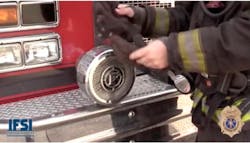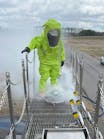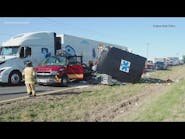IFSI and UL FSRI Offer Course on Cardiovascular and Chemical Exposure Risks
October 5, 2018 – The Illinois Fire Service Institute (IFSI) and the UL Firefighter Safety Research Institute (FSRI) has released a new online course entitled Evidence Based Approaches to Reduce Your Cardiovascular & Chemical Exposure Risks. The course, available at no cost to firefighters and fire service professionals, is based on a large-scale comprehensive research study and is designed to help students better understand the health issues associated with fireground activities. The project is supported by the U.S. Department of Homeland Security and Federal Emergency Management Agency's Assistance to Firefighters Grant Program awarded to the Board of Trustees of the University of Illinois. Additional support is from the CDC Foundation and the National Toxicology Program.
IFSI and UL FSRI have partnered to deliver this online learning resource. The project purpose is to help fire service professionals better understand how operating in today’s fire service is related to the two leading health issues facing firefighter: specifically, cardiovascular events (heart attacks) and chemical exposure related to carcinogenic risks (cancer). The conclusions are based off of the large-scale study conducted by partners from IFSI Research, UL FSRI, the National Institute for Occupational Safety and Health (NIOSH), Skidmore College, and the University of Illinois Chicago.
IFSI Director of Research, Dr, Gavin Horn, acknowledges, “Lessons learned from the Cardiovascular & Chemical Exposure Risks in Today’s Fire Service project are now available in this new and unique format. Thanks to UL FSRI’s expertise in leveraging adult learning tools and techniques for the Fire Service, we hope this program can provide actionable insights into findings from this complex project in order to allow firefighters to under understand how this data can apply to their specific operations.”
Steve Kerber, Director of UL FSRI states “We are excited to get this important science to the streets in a way that will increase the knowledge of the fire service. The course includes many take aways that be implemented by the fire service immediately. There is much more research to be done and this multi-agency team is working hard everyday to answer the fire service’s evolving challenges and questions. ”
The online classroom will be available on October 5 and can be accessed at: https://ulfirefightersafety.org/resources.html#training/evidence-based-approaches-to-reduce-your-cardiovascular-and-chemical-exposure-risks
Check out Firehouse's Fire Service Research: 10 Considerations Related to Cardiovascular & Chemical Exposure Risk.
About IFSI:
The Illinois Fire Service Institute (IFSI) is the statutory State Fire Academy for Illinois. It serves as the oldest continuous fire training institution in the United States. Since 1925, first responders from across the state and world have relied on IFSI to deliver hands-on, innovative, and top quality training, education, and research. Located in Champaign, the main IFSI campus offers a 28-acre training ground with class-a live fire props and training equipment. Courses are delivered on campus, at state regional training centers, and local fire departments across the United States and Internationally. For more information about the Illinois Fire Service Institute, contact Jill Sauer at [email protected] or 217/300-6036.
About UL FSRI
UL Firefighter Safety Research Institute (FSRI) advances fire research knowledge and develops cutting edge, practical fire service education aimed at helping firefighters stay safe while more effectively protecting people and property. Guided by a global advisory board comprised of fire service personnel, UL FSRI investigates residential, commercial, and industrial fires through full-scale testing, field-testing, and modeling to replicate actual fires faced by firefighters. Research results are shared through interactive training courses that have reached hundreds of thousands of firefighters globally. To learn more, visit ULFirefighterSafety.org.






